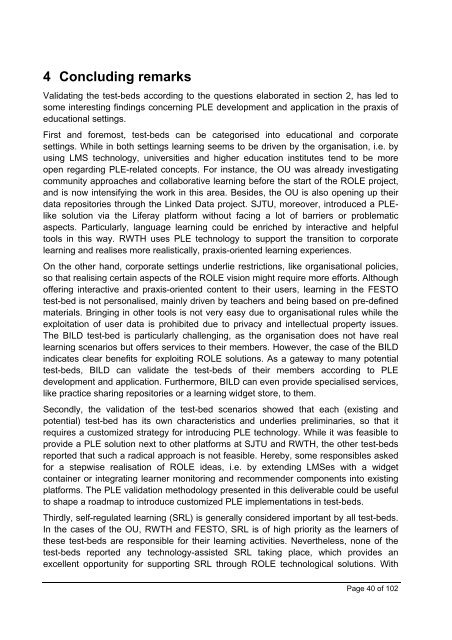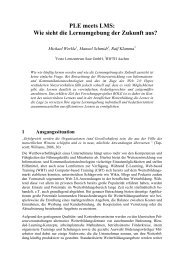Customized PLE implementations for test-bed scenario ... - ROLE
Customized PLE implementations for test-bed scenario ... - ROLE
Customized PLE implementations for test-bed scenario ... - ROLE
You also want an ePaper? Increase the reach of your titles
YUMPU automatically turns print PDFs into web optimized ePapers that Google loves.
4 Concluding remarks<br />
Validating the <strong>test</strong>-<strong>bed</strong>s according to the questions elaborated in section 2, has led to<br />
some interesting findings concerning <strong>PLE</strong> development and application in the praxis of<br />
educational settings.<br />
First and <strong>for</strong>emost, <strong>test</strong>-<strong>bed</strong>s can be categorised into educational and corporate<br />
settings. While in both settings learning seems to be driven by the organisation, i.e. by<br />
using LMS technology, universities and higher education institutes tend to be more<br />
open regarding <strong>PLE</strong>-related concepts. For instance, the OU was already investigating<br />
community approaches and collaborative learning be<strong>for</strong>e the start of the <strong>ROLE</strong> project,<br />
and is now intensifying the work in this area. Besides, the OU is also opening up their<br />
data repositories through the Linked Data project. SJTU, moreover, introduced a <strong>PLE</strong>like<br />
solution via the Liferay plat<strong>for</strong>m without facing a lot of barriers or problematic<br />
aspects. Particularly, language learning could be enriched by interactive and helpful<br />
tools in this way. RWTH uses <strong>PLE</strong> technology to support the transition to corporate<br />
learning and realises more realistically, praxis-oriented learning experiences.<br />
On the other hand, corporate settings underlie restrictions, like organisational policies,<br />
so that realising certain aspects of the <strong>ROLE</strong> vision might require more ef<strong>for</strong>ts. Although<br />
offering interactive and praxis-oriented content to their users, learning in the FESTO<br />
<strong>test</strong>-<strong>bed</strong> is not personalised, mainly driven by teachers and being based on pre-defined<br />
materials. Bringing in other tools is not very easy due to organisational rules while the<br />
exploitation of user data is prohibited due to privacy and intellectual property issues.<br />
The BILD <strong>test</strong>-<strong>bed</strong> is particularly challenging, as the organisation does not have real<br />
learning <strong>scenario</strong>s but offers services to their members. However, the case of the BILD<br />
indicates clear benefits <strong>for</strong> exploiting <strong>ROLE</strong> solutions. As a gateway to many potential<br />
<strong>test</strong>-<strong>bed</strong>s, BILD can validate the <strong>test</strong>-<strong>bed</strong>s of their members according to <strong>PLE</strong><br />
development and application. Furthermore, BILD can even provide specialised services,<br />
like practice sharing repositories or a learning widget store, to them.<br />
Secondly, the validation of the <strong>test</strong>-<strong>bed</strong> <strong>scenario</strong>s showed that each (existing and<br />
potential) <strong>test</strong>-<strong>bed</strong> has its own characteristics and underlies preliminaries, so that it<br />
requires a customized strategy <strong>for</strong> introducing <strong>PLE</strong> technology. While it was feasible to<br />
provide a <strong>PLE</strong> solution next to other plat<strong>for</strong>ms at SJTU and RWTH, the other <strong>test</strong>-<strong>bed</strong>s<br />
reported that such a radical approach is not feasible. Hereby, some responsibles asked<br />
<strong>for</strong> a stepwise realisation of <strong>ROLE</strong> ideas, i.e. by extending LMSes with a widget<br />
container or integrating learner monitoring and recommender components into existing<br />
plat<strong>for</strong>ms. The <strong>PLE</strong> validation methodology presented in this deliverable could be useful<br />
to shape a roadmap to introduce customized <strong>PLE</strong> <strong>implementations</strong> in <strong>test</strong>-<strong>bed</strong>s.<br />
Thirdly, self-regulated learning (SRL) is generally considered important by all <strong>test</strong>-<strong>bed</strong>s.<br />
In the cases of the OU, RWTH and FESTO, SRL is of high priority as the learners of<br />
these <strong>test</strong>-<strong>bed</strong>s are responsible <strong>for</strong> their learning activities. Nevertheless, none of the<br />
<strong>test</strong>-<strong>bed</strong>s reported any technology-assisted SRL taking place, which provides an<br />
excellent opportunity <strong>for</strong> supporting SRL through <strong>ROLE</strong> technological solutions. With<br />
Page 40 of 102



